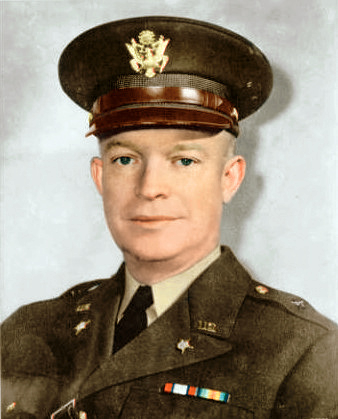Report by Gen. Eisenhower on the Patton incident
November 26, 1943

During the Sicilian campaign, Gen. Patton was the mainspring of the effort during the sustained drive of the Seventh Army from Gela all the way to Messina. He absolutely refused to accept procrastination or any excuse for delay, with a resulting rapid advance of that army which had much to do with the early collapse of resistance in Sicily. He drove himself as hard as he did the members of his army throughout the campaign and consequently became almost ruthless in his demands upon individual men.
While visiting wounded in hospitals in two instances, he encountered unwounded patients who had been evacuated for what is commonly known as “battle anxiety,” specifically nerve difficulty. Also, one man had a temperature. He momentarily lost his temper in these two instances and in an unseemly and indefensible manner upbraided the individuals, and in one of the cases cuffed the individual so that the man’s helmet rolled off his head. These incidents were first reported officially to me by a medical officer, this report being followed by reports from three reputable newspapermen.
Prior to receiving the report from the pressmen, I took the following action:
First, to Gen. Patton I wrote a letter advising him of the allegation, expressing my extreme displeasure, and informing him that any repetition would result in his instant relief. Further, I told him that he would necessarily make, on his own initiative, to the individuals involved, amends, and, if necessary, take the necessary steps to make proper amends before his whole army. I also told him that I would reserve decision affecting his relief from command of the army until I could determine the effect of his own corrective action.
Second, the problem before me was whether the incidents as reported were sufficiently damaging to Patton and to his standing in his army to compel me to relieve him, thus losing to the United Nations his unquestioned value as commander of an assault force, or whether less drastic measures would be appropriate.
I sent Gen. Lucas to make a complete investigation of the affair. I also sent another general officer to Sicily and made a short visit there myself for the purpose of determining whether or not any resentment existed in the Seventh Army against Gen. Patton.
The following action was taken by Patton:
He personally sought out the individuals involved and the persons who were present at the time the incidents took place. To these he made full apologies which it was reported to me were accepted. In addition, he visited each and every division in the Seventh Army and called together all officers, to whom he registered his regret that he should have been guilty of any conduct which could be considered unfair or un-American. The officers of these divisions in turn relayed this message to the enlisted men.
The measures taken by Patton were discussed by me with the three newspapermen who have reported the incident, and apparently, they were convinced that the measures taken were adequate in the circumstances.
On top of all this, I sent the theater Inspector General to make a thorough inspection of the Seventh Army with the particular mission of determining whether or not there existed in that force any general resentment against Patton. The Inspector General reported to me that, while there was more or less general knowledge that incidents of the character described had taken place, the men themselves felt that Gen. Patton had done a splendid overall job and no great harm had been done.
In this connection, it must be remembered that, while the conduct of Patton in these specific cases was indefensible and resented by every officer who knew of it, Patton has in thousands of cases personally supported, encouraged and sustained individuals. The net result was that throughout the Sicilian campaign, the Seventh Army had a high morale.
I personally supervised this investigation throughout and took those steps that seemed applicable in the circumstances because I believe that Gen. Patton has a great field of usefulness in any assault where loyalty, drive and gallantry on the part of the Army commander will be essential.
Gen. Smith had a press conference yesterday with all of the representatives of the press and explained the essentials of the entire story as given above. This was done because of reports of the publication in the United States of exaggerated versions of the story. In this connection, I commend the great body of American newspapermen in this theater, because all of them knew something of the facts involved and some of them knew all, including the corrective action taken and the circumstances that tended to ameliorate the obvious injustice of Patton’s acts. These men chose to regard the matter as one in which the High Command acted for the best interests of the war effort and let the matter rest there. To them I am grateful.
Summing the matter up: It is true that Gen. Patton was guilty of reprehensible conduct with respect to two enlisted men. They were both suffering from a nervous disorder and one man in the case had a temperature. Following an exhaustive investigation, including a personal visit to Sicily, I decided that the corrective action as described above was suitable in the circumstances and adequate. I still believe that this decision was sound. Finally, it has been reported many times to me that in every recent public appearance of Patton before any crowd composed of his own soldiers, he is greeted by thunderous applause.